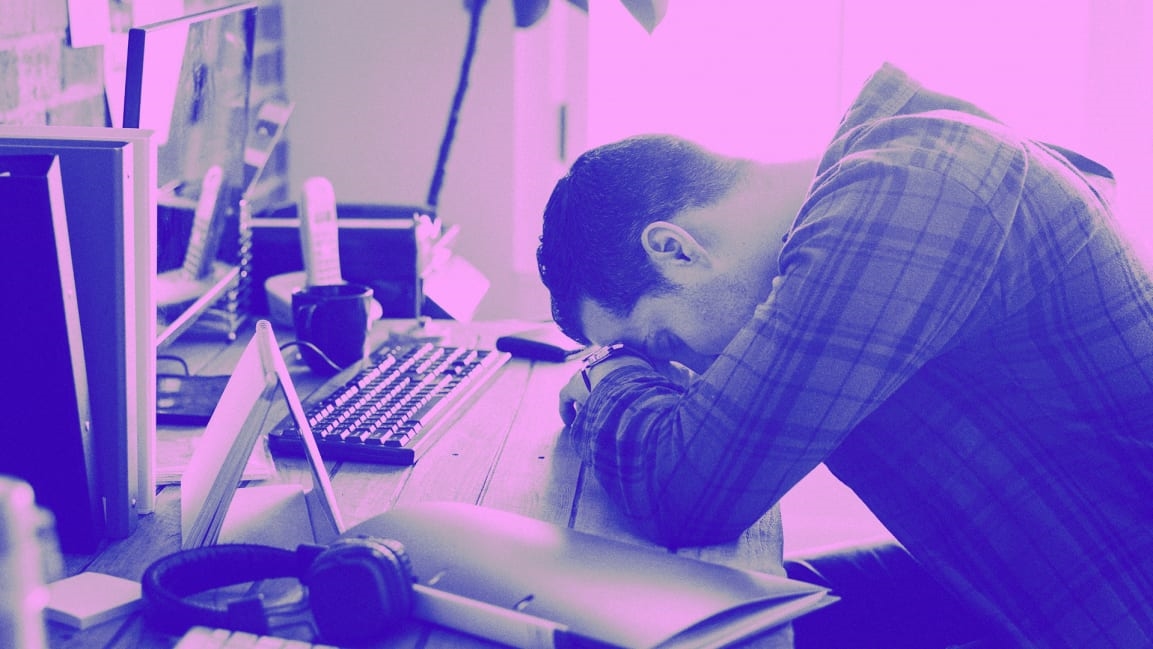How to beat the hidden exhaustion of founding a startup
I can’t remember a time where I wasn’t in pain or run down with a cold. Whenever I was sick, friends would respond with “Again?,” and my personal brand became synonymous with doctor visits and chronic pain.
For the longest time, I thought there was a serious medical ailment that caused many of these problems. And when you can’t figure out the source of your pain, it’s easy to spiral into 500 new theories about why you’re experiencing discomfort.
“I’ve been tired for months and it hurts to get out of bed,” a fellow entrepreneur told me recently.
“I ended up in the ER from stress,” another startup friend confided in me.
Chronic pain and stress-related health problems are the dark side of entrepreneurship that no one talks about, but if you’re a business owner who feels alone in their struggle with these issues, you’re not alone.
In a twist of timing, my body began to deteriorate this year during the coronavirus pandemic. Though I’ve dealt with pain for years, the uptick in stress from the pandemic made my chronic pain debilitating. It hurt to move my neck, it hurt to sleep, and I couldn’t digest anything without having stomach pain. It was frustrating because no matter what I did—I couldn’t fix it. It took the help of a physical therapist to realize that many of my health issues could be traced back to my entrepreneurial lifestyle of chronic stress.
Here’s what I’ve learned since and what you can do to try and alleviate the stress that’s often interchangeable with running a business.
Deep breathing is a good place to start
Over the years, people have always told me to “relax” or to “take deep breaths” as if stress was a switch I could quickly flip and automatically turn zen. Though this advice was well intentioned, it only made me feel like a failure because I was unable to relax no matter how hard I tried. Deep breathing can and should be a tool in your destressing toolbox, but that alone will not alleviate late client payments, having to lay off staff, or tanking sales.
After I threw out my back during a period of high stress, I went to see a physical therapist for my chronic pain. It was one of the best things I’ve ever done for my health, and I would recommend it to anyone. He helped me realize how the body and brain could work with you or against you. For the first time in my life, I understood that mental distress can have a negative impact on your nervous system. To put it simply, when you’re stressed, your body can break down. This simple concept may have taken me 30 years to come to terms with, but it has helped me make an astonishing change to controlling my pain.
Explains Dr. Stephen Chao, a physical therapist and clinical director at ?Flex Physical Therapy: “Think of your body’s tolerance to stress as a bucket. Every stressor we have goes into that bucket regardless of what it is: tissue stresses, client tensions, general work worries, asymmetries from old injuries. . . . This all fills the bucket in a blend of physiological, neurological, and cognitive loads. A pain response is your alarm that the bucket is overflowing.”
There is no one-size-fits-all response for stress—it’s important to try a range of de-stressing methods to see what works for helping you personally. While one person might find comfort in deep breathing, another person might find more relief in hitting a punching bag for 30 minutes. One exercise I was taught that has helped tremendously was to deep breathe along with ?moving my spine and pelvis?, which relaxes my body in a way I hadn’t been able to achieve before.
While my pain isn’t gone completely, I now feel better equipped with the right tools to alleviate it. Now when I feel the pain come on, I try my best to set aside time to do my exercises, get more rest, and—something many entrepreneurs put off until it’s too late—take care of myself.
Say no to opportunities that jeopardize your health
Over the years, I’ve been fortunate enough to travel for work. Despite the joy of new experiences, jumping on a plane every few months took a toll on my health, and just the thought of going to an airport could leave me curled up in a ball of anxiety.
After I would read about a new opportunity (“We’d love to have you speak at our conference!”), the dopamine part of my brain would light up with excitement, but my stomach would be in knots.
How could I fly anywhere when I already wasn’t feeling well and my business was tanking? I felt like a spoiled brat to even consider turning down such a great opportunity. But I knew my body was telling me to decline. And after sending back a message turning down an offer, I would feel a load of stress instantly dissipate.
It’s okay to say no to opportunities that don’t directly align with your business or personal goals.
It’s okay to say no to opportunities that don’t directly align with your business or personal goals. Pick and choose the opportunities that will help further your goals and make you happy. Many entrepreneurs put too much on their plate, which is not sustainable long-term.
“During my startup days, I kept a disciplined, six-hour-per-night sleep schedule,” said Adam Ghahramani, a data scientist at ?CMI/Compas?. “I thought my body had adapted and I was maximizing my productivity. Looking back, the only things I was maximizing were my anxiety, stress, and mental fog.”
Inspired by social media gurus and success stories involving 100-hour workweeks, many entrepreneurs try to hack their bodies into requiring less sleep. More often than not, this ends up being an exercise in self-sabotage.
Remind yourself you are not alone
Before writing this article, I posted to social media asking if any other startup friends had also experienced health issues from running a business. Within minutes, my feed filled up with dozens of stories about hospital visits, handfuls of hair in the shower, and psychological breakdowns. Prior to sharing more, I wouldn’t talk about the stress I was experiencing and incorrectly assumed that it was just me who had trouble coping with business stress.
As an entrepreneur, it’s vital to have a support group. If you don’t feel comfortable talking to your peers, talking to a therapist can help. For me, especially when I am overthinking things, it’s helpful for me to have a weekly session where I can talk to a behavioral therapist trained in anxiety who helps me make sense of what’s going on in my head.
For other business leaders, it can help to organize time and responsibilities. “I [turned to] PTSD therapy to get back on track while running a business.” explained Arry Yu, chair, Washington Technology Industry Association Cascadia Blockchain Council.? “It helped me with reprogramming my sense of safety. I also detoxed with no caffeine and no drinking, walk every day, and sleep 8 hours every night. Limiting how many hours I work forces me to prioritize and focus, [and] at the end of the day, health is wealth.”
It’s okay to take a break from a project (or just let it go)
If you’re an entrepreneur, you’re probably of the school of thought that if something breaks, you can fix it and usually by yourself.
You’ve heard the quote a dozen times, that you need to “put your own oxygen mask on before you can help others with theirs.” Many entrepreneurs don’t think they need oxygen as much as others (I am guilty of this myself). We think we can do everything, be there for everyone, and don’t need any help. This couldn’t be further from the truth.
“It wasn’t until I developed a few ulcers that I decided that the sleepless nights and running on empty to sustain a business for eight years weren’t worth it anymore.” explains Mia Taylor, senior social and influencer manager at ?Bulletproof?. “It was time to take a breather.”
If startup life is taking a toll on your mental and physical health, it’s truly okay to throw in the towel. If that new client isn’t working out, end it. If your new campaign isn’t driving results, chuck it out the window. And if you want to shut your doors down entirely and get a different job—it’s entirely okay.
When you’re beating the proverbial dead (business) horse, your health and sanity are what will suffer in the end. It may feel like you’re quitting, but you’re actually succeeding in regaining your health, which is the most important thing at the end of the day.
So the next time you’re feeling high levels of stress, reach out to your entrepreneurial friends. Chances are they are going through the exact same thing as you. Support each other, and remember that it’s okay to ask for help.
Arianna O’Dell is the founder of Airlink Marketing, a digital design and marketing agency helping companies create digital programs that drive results. When she’s not working with clients or traveling, you’ll find her making fun gifts at Ideas By Arianna.
(40)



